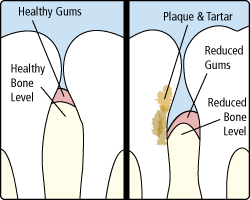Gum Disease in Spokane, WA

Gum disease is a bacterial infection that affects the gum tissue around the teeth and the jawbone that supports the teeth. Gum disease develops when the bacteria in plaque are not removed by flossing and brushing. The bacteria inflame the gums, which results in gingivitis. If left untreated, the bacteria multiply and destroy gum tissue and bone. Over time, this will lead to receding gums, pain, and loss. At Ash & Rowan Family Dentistry, periodontal infection treatments include scaling and root planing, antibiotics, antimicrobial mouth rinses, laser gum therapy, deep cleanings, and surgery.

Causes of Gum Disease
Gum disease is caused by built-up plaque and tartar along the gum line, leading to the gums' continual irritation. The bacteria in the buildup leads to infection of the gum tissue, which causes the gums to swell and eventually recede from the teeth. If the condition is left untreated, it can cause damage to the underlying bone structure, weakening the teeth over time and causing tooth loss.
Many factors can contribute to gum disease, including poor oral hygiene habits, tobacco use, certain medications, hormonal changes in women, and more. It is essential to practice good oral hygiene to prevent gum disease. This includes brushing at least twice daily for two minutes, flossing regularly to remove plaque and food particles between the teeth and under the gum line, and visiting the dentist for regular checkups and cleanings.
Treatment for Gum Disease
A dentist will perform a thorough examination to diagnose gum disease. They will then determine if it can be treated with non-surgical methods or if surgery is necessary. In many cases, patients benefit from a combination of both types of treatment to achieve the best results possible.
Scaling and root planing remove bacteria and infected tissue below the gum line. Antibiotics kill the harmful bacteria that cause the infection. Antimicrobial mouth rinses help control bacterial growth in the mouth. Laser treatment helps prevent the growth of bacteria in the pockets between the teeth and gums. Deep cleanings treat moderate to advanced periodontal disease. Surgery can be used when other treatments are unsuccessful.
If gum recession has occurred as a result of periodontal disease, then this can be treated using grafting procedures. This involves using donor tissue from the roof of the mouth to replace missing gum tissue along the gum line. Over time, it promotes new tissue growth in these areas, restoring the gum line to its original position.
Patients typically experience symptoms like swollen, receding, and bleeding gums when they start showing signs of developing gum disease. If you have the following symptoms, visit Ash & Rowan Family Dentistry at 5528 N Ash St, Spokane, WA 99205, or call (509) 325-1886.
Office Hours
MON - THU7:00 am - 3:30 pm
FRI7:00 am - 1:00 pm
SAT - SUNClosed



